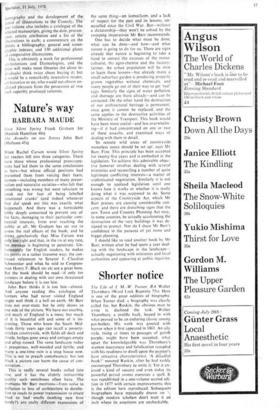Nature's way
BARBARA MAUDE
Since Silent Spring Frank Graham Jnr (Hamish Hamilton 40s) The Assaults on our Senses John Barr (Methuen 45s) When Rachel Carson wrote Silent Spring her readers fell into three categories. There were those whose professional preoccupa- tions had led them to the same conclusions as hers—but whose official positions had prevented them from voicing their fears; laymen—including members of many preser- vation and naturalist societies—who felt that something was wrong but were reluctant to speak out for fear of being labelled 'emotional cranks' (and indeed whenever they did speak out this was exactly what happened). And there was a formidable lobby deeply concerned to prevent any of the facts, damaging to their particular com- mercial interests, from ever reaching the public at all. Mr Graham has set out to assess the real effects of the book; and he shows conclusively that Miss Carson was only too right and that, in the us at any rate, the message is beginning to penetrate. Un- fortunately for English readers, he makes his points in a rather tiresome way; the con- tinued references to Senator J. Claudius Schwooster and what he said to Congress- man Henry F.-Black etc etc are a great bore. But the book should be read—if only for pointers in dealing with our own threatened landscape before it is too late.
John Barr thinks it is too late—almost. And anyone reading this catalogue of horrors who had never .visited England might well think it a hell on earth. Mr Barr does not over-state; but he only shows us one side of the picture. We have our exurbia, and much of England is a mess; but much of it is beautiful still and some of it im- proving. Those who knew the South Mid- lands thirty years ago can recall a poverty- stricken countryside, with fields all dock and thistle, hedges gone away and cottages empty and often ruined. The same landscape today is prosperous, well-wooded and fertile; and many a one-time ruin is a snug house now. This is not to preach complacency; but too black a picture can harm the cause of con- servation.
This is really several books rolled into one; and it has the slightly indigestible quality such omnibuses often have. The problems Mr Barr mentions—from noise to pollution to loss of architecture to derelic- tion to roads to power transmission to ersatz food to bad smells (nothing new here surely?) are really different expressions of
the same thing—an iconoclasm, and a lack of respect for the past and its lessons, un- equalled since the Civil War. But—without a dictatorship—they won't be solved by the sweeping imperatives Mr Barr recommends. One has to decide what must be done, what can be done—and how—and what nature is going to do for us. There are signs already that nature is beginning to take a hand to correct the excesses of the mono- culturist, the agro-chemist and the factory- farmer. An urban population will be slow to learn these lessons—but already many a small suburban garden is producing properly grown vegetables without chemicals, and many people go out of their way to get 'real' eggs. Similarly the signs of water pollution and shortage are there already—and can be corrected. On the other hand the destruction of our architectural heritage is permanent; once gone it cannot be replaced, and the same applies to the destructive activities of the Ministry of Transport. This book would have been more useful—and less overwhelm- ing—if it had concentrated on one or two of these assaults, and examined ways of dealing with them in detail.
'In remote wild areas of countryside motorless zones should be set up', says Mr Barr. Fine. This principle has been accepted for twenty-five years and is embodied in the legislation. To achieve this admirable objec- tive however involves dealing with several ministries and reconciling a number of quite legitimate conflicting interests—a matter of sophisticated negotiation. Similarly it is not enough to applaud legislation until one knows how it works or whether it is really doing what it was supposed to do. Some aspects of the Countryside Act, which Mr Barr praises, are causing considerable con- cern; and there are disturbing signs that the new Town and Country Planning Act may, in some counties, be actually accelerating the destruction of the very buildings it was de- signed to protect. Nor do I share Mr Barr's confidence in the panacea of yet more and bigger planning.
I should like to read another book by Mr Barr, written after he had spent a year deal- ing with the landscape in the landscape— actually negotiating with ministries and local authorities and appearing at public inquiries.






























 Previous page
Previous page